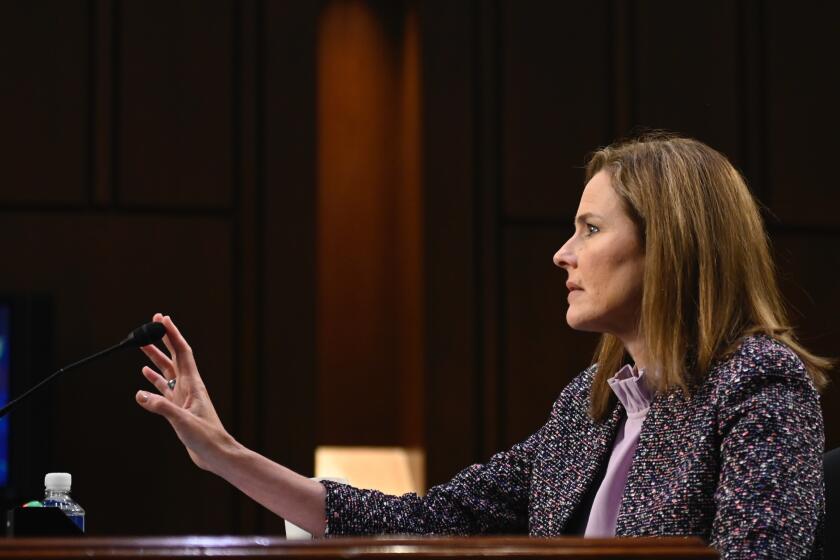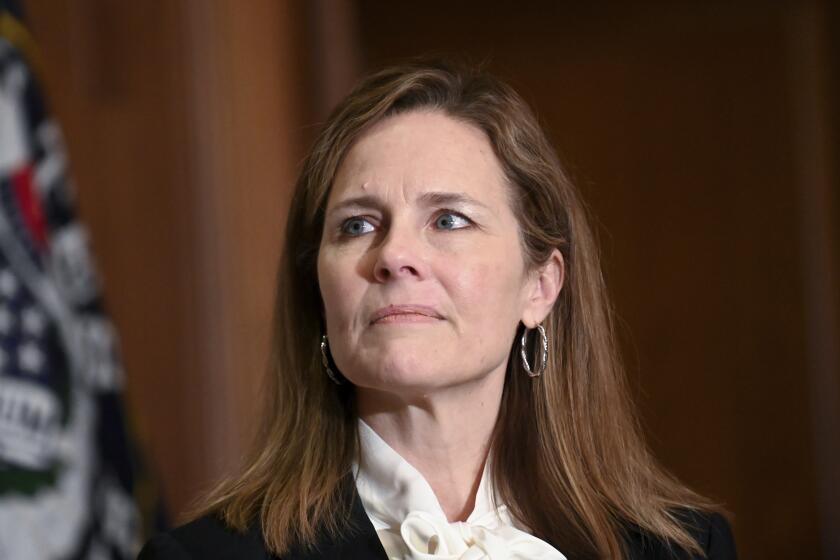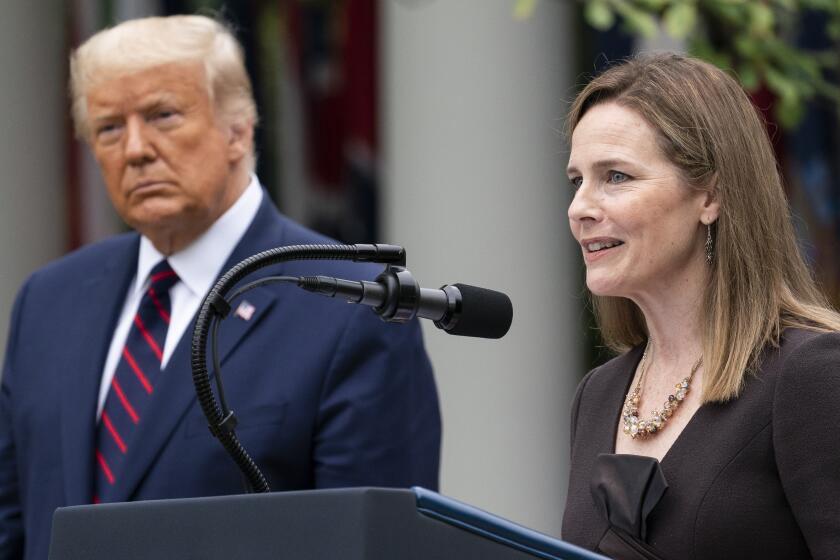Barrett says her past criticisms of rulings on abortion, Obamacare don’t signal how she would vote now

Barrett sidestepped questions about that landmark case from the Senate Judiciary Committee’s top Democrat, California Sen. Dianne Feinstein, as the panel held a second day of hearings on Barrett’s nomination.
WASHINGTON — Judge Amy Coney Barrett spent most of the second day of her Supreme Court confirmation hearing batting away Democrats’ predictions that she would provide the final vote needed to invalidate the Affordable Care Act and substantially rein in abortion rights, but she struggled to reconcile assurances that she had an open mind with her past writings that demonstrated strong opinions.
“I am standing before the committee today saying that I have the integrity to act consistently with my oath and apply the law,” she told members of the Senate Judiciary Committee on Tuesday.
The conservative judge has batted away questions in long and lively exchanges, insisting she would bring no personal agenda to the court.
Throughout the day, Barrett — as most other Supreme Court nominees have done — consistently refused to comment about her views on issues that were likely to come before the court. She insisted she had “no agenda” other than to respect the rule of law.
But unlike most other recent high court nominees, Barrett has an unusually long record of public writings and letters on hot-button issues, such as abortion. And Democrats pressed her to explain them.
As an appellate court judge in 2018, she joined a dissent in support of an Indiana law that would have banned abortions based on a disability or deformity.
While a Notre Dame law professor in 2013, Barrett signed a public letter criticizing the landmark abortion ruling Roe vs. Wade and calling for “the unborn to be protected in law.” In 2006, she signed on to an ad that called for an “end to the barbaric legacy of Roe vs. Wade.”
Barrett said that she signed on to the ad on the “way out of church,” as a private citizen, and that it was “consistent” with the church’s views and a “pro-life” viewpoint. While she said she has “personal feelings about abortion,” she told Republican Sen. Lindsey Graham of South Carolina, the committee chairman, that she would set aside her Catholic beliefs on the bench.
Sen. Dianne Feinstein (D-Calif.) repeatedly pressed Barrett to give her opinion of the 1973 Roe case, and the 1992 ruling in Planned Parenthood vs. Casey. The two cases are the bedrock of Americans’ right to access abortion.
“It would actually be wrong — a violation of the canons — for me to do that as a sitting judge,” Barrett said. “So if I express a view on a precedent one way or another, whether I say I love it or I hate it, it signals to litigants that I might tilt one way or another on a pending case.”
In response to questions from Sen. Amy Klobuchar (D-Minn.), Barrett acknowledged that she doesn’t view Roe as a “super-precedent,” a scholarly term used to describe a Supreme Court decision that is so widely accepted that it is at no risk of being overturned.
Barrett said that while she viewed the anti-discrimination ruling Brown vs. Board of Education of Topeka as a super-precedent, she wouldn’t put Roe in that category because the public is divided on the issue and calls to overturn the abortion decision continue.
“I’m answering a lot of questions about Roe, which I think indicates that Roe does not fall into that category,” Barrett said.
With conservatives on the cusp of securing a rare 6-3 majority on the nation’s highest court, Democrats also repeatedly warned that she would vote to strike down the 2010 healthcare law if seated in time to hear arguments in a case scheduled to come before the court a week after the election.
Democratic senators peppered her with questions about a 2017 essay in which she criticized Chief Justice John G. Roberts Jr.’s 2012 opinion that upheld the Affordable Care Act. In that article, she said Roberts pushed “the Affordable Care Act beyond its plausible meaning to save the statute.”
But she said Tuesday the critique was irrelevant to the pending dispute because it involved different issues about the law.
“I assure you I am not hostile to the ACA. I am not hostile to any statute that you pass,” she said.
The current Supreme Court case is Republicans’ third attempt to invalidate the 2010 healthcare law through the courts. They are arguing that because Congress in 2017 in effect ended the “individual mandate” that required all Americans to have health insurance, the entire law should fall.
Barrett said the specific issue in that case is severability, or whether the rest of the law stands if the individual mandate provision is gone.
She acknowledged that during a moot court exercise she participated in last month, she “ruled” that the rest of the healthcare law could stand without the provision. “I voted to say that [the mandate] was unconstitutional, but severable,” she said.
But Barrett cautioned senators that the move does not necessarily reflect her “actual views” or how she would rule if appointed to the Supreme Court because she did not have access to all briefs in the mock proceeding. The moot court was conducted at William & Mary Law School before the death of Justice Ruth Bader Ginsburg, whose seat Barrett was subsequently nominated to fill.
Sen. Mike Crapo (R-Idaho) said her conclusion in the mock exercise nevertheless provides an “answer, frankly, to a lot of those raising this specter that you’re going to take the whole Affordable Care Act away from everyone because of this very narrow case.”
Unlike most recent Supreme Court picks, Barrett has taken a public stand on divisive issues, including abortion, contraceptives, guns and healthcare.
Barrett would also not commit to recusing herself if disputes arose out of the election. President Trump has said the Senate needed to move quickly to confirm his Supreme Court pick before Nov. 3 because she could decide the outcome of a challenged 2020 election. Multiple Democrats have demanded that she recuse herself as a result. Barrett said she would weigh what to do if the situation arose.
“I would certainly hope that all members of this committee would have more confidence in my integrity than to think that I would allow myself to be used as a pawn to decide this election for the American people,” Barrett said.
Barrett said she did not commit to anyone about how she would vote on an election dispute, the Affordable Care Act or any other case.
“I have made no commitment to anyone — not in this Senate, not over at the White House — about how I would decide any case,” she said.
On a personal level, Barrett spoke about her frustration over how she had been portrayed in the media, saying she’s avoided coverage of her nomination for her mental health.
“You know you can’t keep yourself walled off from everything,” she said. “And I’m aware of a lot of the caricatures that are floating around.”
Multiple news outlets have examined Barrett’s conservative Catholic faith and her membership in a controversial charismatic Christian group that former members and liberal critics have likened to a cult. The group has become a tinderbox in the nomination because of its teaching that men are the head of the family household, though it has not come up in the hearing.
Amy Coney Barrett, nominated to replace Justice Ruth Bader Ginsburg, joined a ruling in a moot court that kept the Affordable Care Act in place.
“We knew that our faith would be caricatured; we knew our family would be attacked,” she said. “So we had to decide whether those difficulties would be worth it because what sane person would go through that if there wasn’t a benefit on the other side.”
One of the most memorable moments of the hearing came when Barrett was asked whether she watched the video showing the death of George Floyd, a handcuffed Black man who died May 25 after a white police officer pressed a knee into his neck for several minutes.
“As you can imagine, given that I have two Black children, that was very, very personal for my family,” Barrett said.
Barrett said her 16-year-old daughter, Vivian, whom she adopted from Haiti, took the death hard because she realized she and her brother, John Peter, who was also adopted from Haiti, might be exposed to such brutality. “It was very difficult for her, and we wept together in my room,” Barrett said.
“I had to explain some of this to them,” she added. “I mean, my children to this point in their lives have had the benefit of growing up in a cocoon where they have not yet experienced hatred or violence.… It’s a difficult one for us, like it is for Americans all over the country.”
More to Read
Get the L.A. Times Politics newsletter
Deeply reported insights into legislation, politics and policy from Sacramento, Washington and beyond. In your inbox three times per week.
You may occasionally receive promotional content from the Los Angeles Times.












